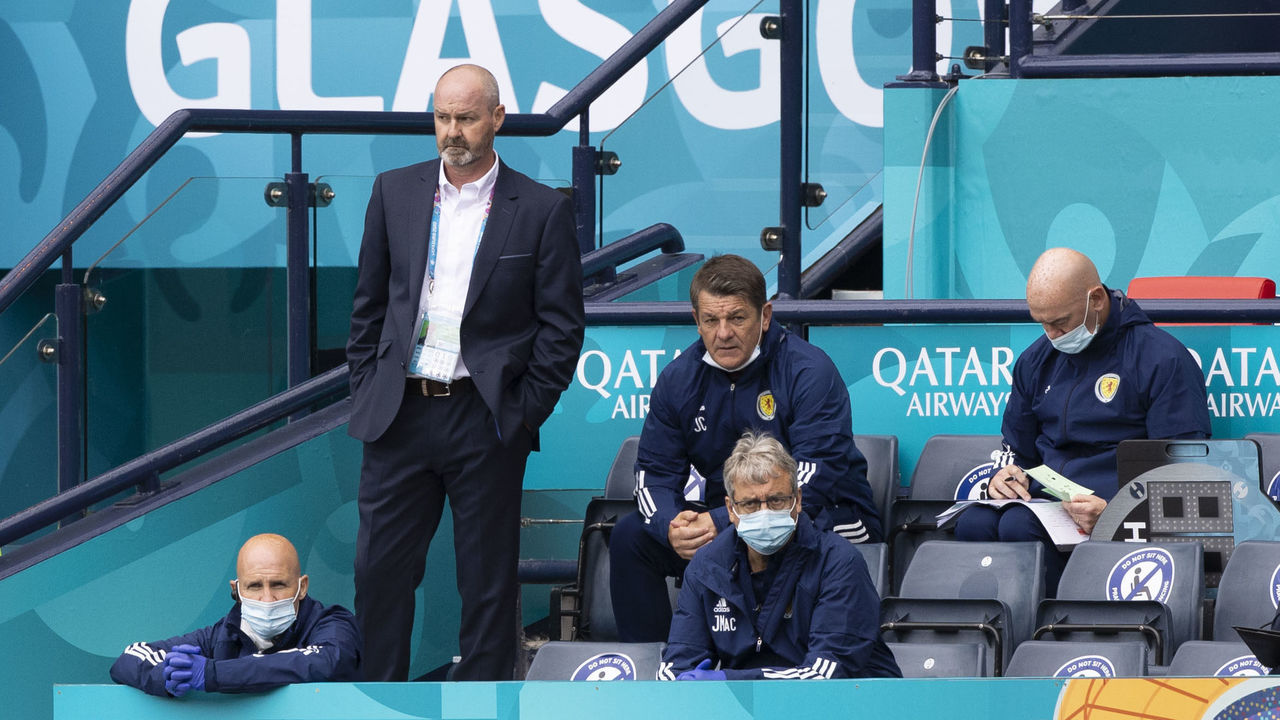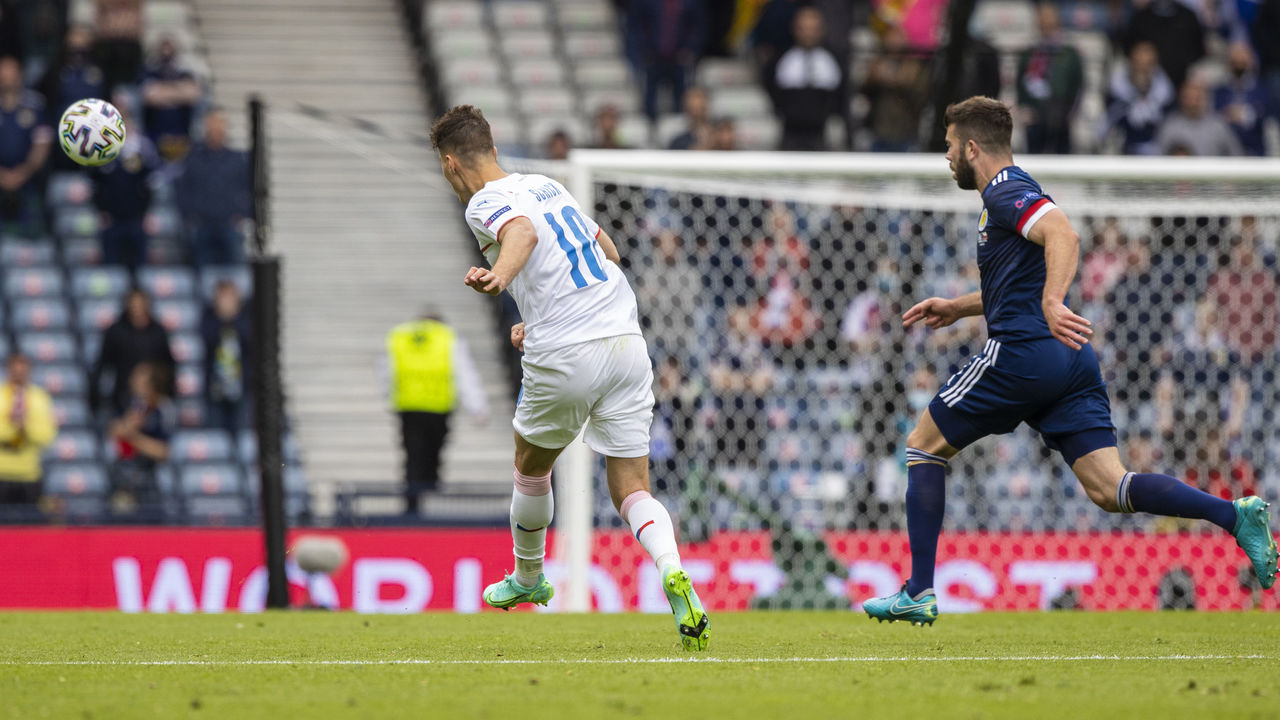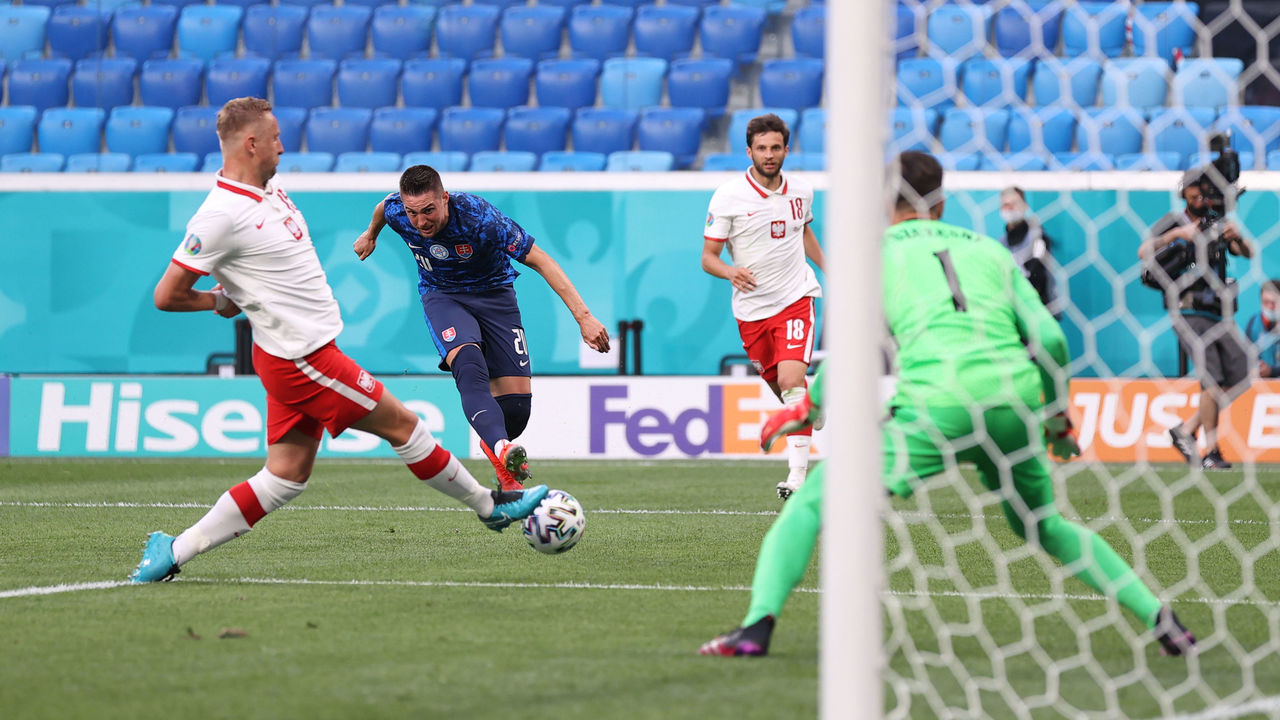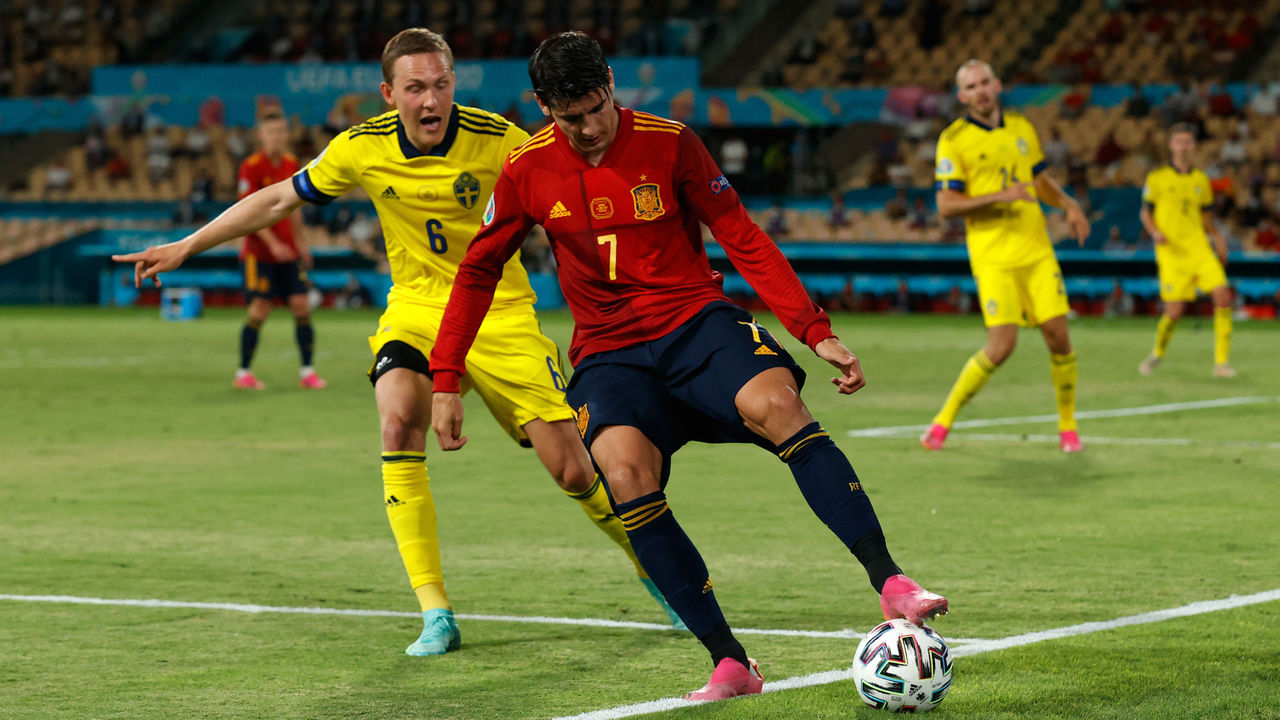5 takeaways from Monday's action at Euro 2020
One year later, Euro 2020 is finally underway. At the end of every matchday, we'll be dissecting the biggest talking points from all the action. Below, we look back on Monday's trio of games.
Scotland's Clarke under fire
Scotland manager Steve Clarke is left to reflect on his team selection in the wake of a 2-0 defeat to the Czech Republic at Hampden Park.
Clarke couldn't do anything about Kieran Tierney's injury absence. The Arsenal star would have been an ideal distributor in a back-three that sorely missed his influence. Should Tierney remain sidelined, Clarke might consider shifting midfielder Scott McTominay into a central defensive role to boost Scotland's distribution, potentially giving Chelsea wunderkind Billy Gilmour a chance to start in the middle of the park.
The manager opted to start his former Kilmarnock pupil Stephen O'Donnell at right wing-back, and the current Motherwell defender was very much a passenger to the Czech attacks down that flank. O'Donnell wasn't any better at providing width, either.

Jack Hendry was poor on the left side of the back-three, and it's little coincidence that Scotland looked better when it switched to a back-four after Callum McGregor replaced Hendry in the 67th minute.
Finally, the decision to start Ryan Christie alongside Lyndon Dykes in a two-man attack left a lot to be desired. Christie's best moment on the day was a skilled run past two Czech markers before being unwittingly tackled by his own teammate O'Donnell in the penalty area. It was that kind of day for Christie, though neither he nor Dykes made a good account of themselves, displays made worse by Southampton striker Che Adams' omission from the starting XI.
Clarke is his own worst enemy ahead of Thursday's pivotal clash with neighboring England, and there's little room for favoritism during his side's first major tourney in 23 years.
Czechs look primed to surprise
Patrik Schick will get all the plaudits for his standout performance against Scotland, which included a 50-yard wonder goal to cap off a 2-0 victory. But that shouldn't take away from the overall impressive display by the seemingly forgotten Czech Republic team.
Most of the focus heading into Euro 2020 revolved around the storylines in Group D; England's rematch with Croatia after the heartbreak at the 2018 World Cup, and the revival of football's oldest and fiercest rivalry on the international stage between the Three Lions and Scotland.

Meanwhile, the Czech Republic was treated as somewhat of an afterthought.
Fast forward to the final whistle at Hampden Park, and suddenly the Czech Republic finds itself atop the group ahead of its meeting with an aging Croatia side looking like a shell of the team that finished runner-up at the World Cup three years ago. Even if they fail to see off Croatia, the Czechs will like their chances of nicking a result against England and possibly beating Gareth Southgate's team for the second time in under a year.
Poland the master of its own demise
Poland did little to help fulfill its pre-tournament dark horse designation in a 2-1 defeat to Slovakia in St. Petersburg.
Slovakia opened the scoring in the 18th minute when Robert Mak's close-range effort pinged off the near post and ricocheted off Wojciech Szczesny's back and into the net. The Juventus netminder became the first 'keeper to score an own goal in European Championship history.
Then, 16 minutes after Karol Linetty equalized seconds after the interval, midfield mainstay Grzegorz Krychowiak got his marching orders when he picked up a daft second yellow. Poland was in the ascendancy at that juncture in the contest, a momentum that was effectively zapped when the Lokomotiv Moscow veteran caught the first train to the locker room.

With that sending off, Poland became just the second side in tournament history to score an own goal and have a player sent off in the same match. The only other team to manage that distinction was Czechoslovakia in 1976 against the Netherlands. The Czechs went on to win that tournament, something Poland has no chance of doing if it keeps shooting itself in the foot.
How far can this approach carry Sweden?
Nobody expected Sweden to be adventurous going into Euro 2020; being stingy at the back and taking the few created chances has long been a staple of this team, particularly since Janne Andersson took over behind the bench. That same approach, built around a solid 4-4-2 formation, got the Swedes all the way to the quarterfinals of the 2018 World Cup, after all.
And there's nothing wrong with that. You needn't look further than Portugal, which conquered the Euros five years ago with a conservative plan of its own, for proof that unadventurous tactics can deliver success.
The losses of Zlatan Ibrahimovic and Dejan Kulusevski - the first to a knee injury, the latter to a positive COVID-19 test - made it even more likely that Andersson would opt for a reserved setup, especially in the team's opener against a Spain side boasting superior talent.
But what we got was probably a step too far. Spain deserves credit for imposing its will and having almost complete autonomy of the ball, of course, but Sweden needs to show some desire to attack if it's to accomplish more than simply emerging from the group stage.
By the end of the first half on Monday, Spanish center-back Aymeric Laporte had completed more passes than the entire Swedish team to that point.
Spain had 83% possession in the first half vs Sweden.
— Paul Carr (@PaulCarr) June 14, 2021
🇪🇸 That’s the highest possession percentage by any team in any half of a European Championship game since 1980 (as far back as Stats Perform has tracked possession). pic.twitter.com/qRIEu15MNL
Again, there's nothing wrong with approaching matches this way if you think it gives you the best opportunity to succeed; there's no "right" way to win games. Ask Portugal. Or Greece in 2004. Or Italy in 2006. Style points are fun, but they don't really matter.
Ultimately, you can argue the approach worked in Seville; Sweden nicked a point against the group favorite without conceding a goal.
But such a defensive setup does mean Sweden will be relying on absolutely clinical finishing, some slices of luck, and heroic goalkeeping all tournament. With Marcus Berg missing a sitter and Alexander Isak seeing a deflected effort come back off the post, the Swedes didn't get the first two. Robin Olsen was immense between the sticks, but it might be asking too much of him to be impenetrable every game.
No more Morata?
Luis Enrique had plenty of big selection decisions for Spain's opener. Unai Simon or David De Gea in goal? Simon. Eric Garcia or Aymeric Laporte to partner Pau Torres in central defense? Laporte. Give youngsters Pedri and Ferran Torres their debuts at a major tournament? Of course.
But the pick at the top of the lineup will likely face the greatest scrutiny over the next few days. Does Alvaro Morata, possibly the planet's most prolific striker when he's in an offside position, deserve to spearhead this latest Roja generation?
He did little to justify his place in the starting XI in the 0-0 draw with Sweden. Morata's work off the ball was reasonable - he put in two tackles to assist Spain's possession obsession - but he needed to be clinical when Sweden was determined to keep chances at a premium in Seville.

And Morata couldn't hit the target with each of his three shots, including when Marcus Danielson's missed interception gifted the Juventus forward a one-on-one that he inexplicably rolled wide of the far post.
Morata's natural replacement is Gerard Moreno, who's just concluded the finest season of his career with Villarreal. The 29-year-old was thwarted by the impenetrable Robin Olsen with a late header after his 74th-minute introduction and was generally a more combative presence in attack, so he's surely winning the race for a start against Poland on Saturday.
2020-21 club season:
| Player | League apps | Goals | European apps | Goals |
|---|---|---|---|---|
| Alvaro Morata | 32 | 11 | 8 | 6 |
| Gerard Moreno | 33 | 23 | 11 | 7 |
After that, the options are limited. Ferran Torres did a commendable job at Manchester City when he filled in at center forward during the Champions League group stage, but it's not the best use of his talents. The other alternative would be for Enrique to thrust one of his many midfielders into a false nine role, similar to how Cesc Fabregas operated during Spain's victorious Euro 2012 run.